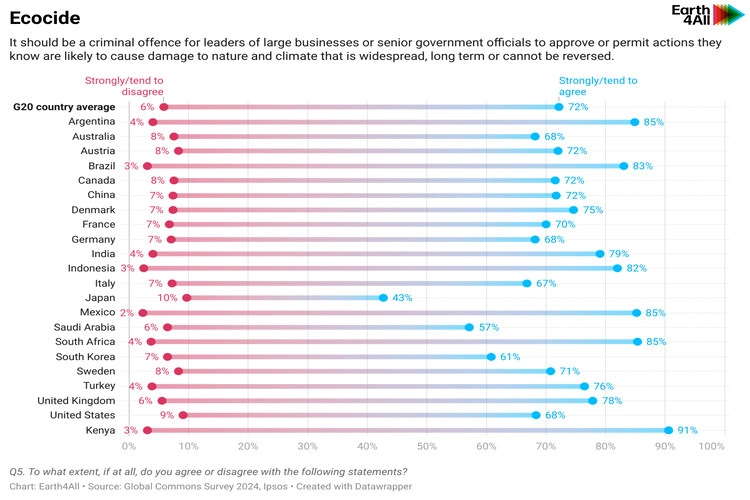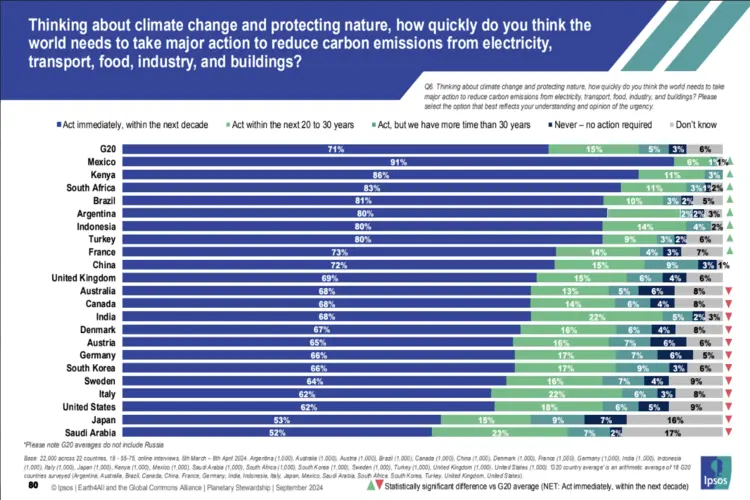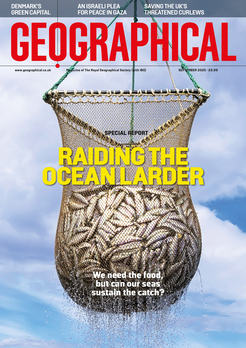
Global survey of G20 citizens finds overwhelming public demand for tougher laws against environmental damage
By
A recent survey into 18 G20 countries has found that almost three-quarters (72 per cent) of respondents support the adoption of ecocide laws – making it a criminal offence for leaders to approve actions that cause serious environmental damage.
The Global Commons Survey 2024 – conducted by Ipsos UK and commissioned by Earth4All and the Global Commons Alliance (GCA) – polled 22,000 participants aged 18 to 75 across 18 G20 countries excluding Russia – as well as four countries outside the G20: Austria, Denmark, Kenya and Sweden.
The study found 59 per cent of respondents were very or extremely worried about the state of nature today, an increase from the previous survey conducted in 2021. 69 per cent agreed that the planet is nearing climate and nature tipping points – points at which small changes accumulate to cause irreversible larger changes – due to human activities.

Respondents were also segmented into five categories depending on planetary stewardship, ranging from ‘Planterary Stewards’ (driven to make systemic change through strong urgency and responsibility) to the lowest engagement, ‘The Unengaged’ (those who are indifferent towards environmental concerns). Across those surveyed in the G20, Planetary Stewards, Concerned Optimists and Steady Progressives made up the majority of respondents, totalling 61 per cent – meaning more people care for the planet than those who do not.
Within G20 countries surveyed, Planetary Stewards make up the largest groupings in Turkey (28 per cent), France (27 per cent – joint largest group with the Steady Progressives), Brazil, (26 per cent), and Mexico (26 per cent – joint largest group with the Steady Progressives). The Unengaged make up the largest groups in Germany, Italy, Japan, and Saudi Arabia. Across the G20, just 13 per cent of people fall into the Climate Sceptic group, according to the survey results.
‘The majority support (72 per cent) for criminalising actions which allow serious damage to the climate surprised us,’ said co-lead of the Earth4All initiative Owen Gaffney. ‘The majority of people want to protect the global commons; 71 per cent believe the world needs to take action immediately.’
‘Our survey demonstrates that people across the world’s largest economies are acutely aware of the urgent need to safeguard our planet for future generations.’

These findings come after landmark legislative changes including in Belgium – where ecocide was recognised as a federal crime – as well as laws being passed in Chile and France. Elsewhere, bills are being proposed to make ecocide illegal, including in countries such as Mexico, Italy and Scotland.
How does environmental concern vary between countries & genders?
The survey also revealed an interesting insight into how environmental concern varies depending on gender. Women tend to express higher levels of concern about the state of nature today, and in the future, compared to men: 62 per cent of women are extremely or very worried about the state of nature today, compared with 56 per cent of men, and 74 per cent of women believe that major action to address environmental issues should be taken immediately within the next decade, compared with 68 per cent of men.
Only 25 per cent of women respondents believe that environmental risks are exaggerated, while 33 per cent of men do – and women also are less likely to believe technology can fix environmental issues without individuals having to make big lifestyle changes too (35 per cent compared with 44 per cent of men).
In emerging economies such as India (87 per cent), China (79 per cent), Indonesia (79 per cent), Kenya (73 per cent) and Turkey (69 per cent), respondents felt more personally exposed to the effects of climate change compared to those in the United States and Europe. Those who perceive themselves as highly exposed to environmental and climate-related risks also show the highest levels of concern and urgency regarding climate action.




